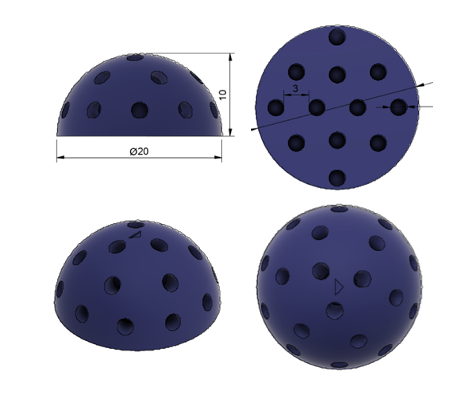Principal Investigator:
Jason A. Spector, Professor of Surgery (Plastic Surgery)
Background & Unmet Need
- In 2020, there were >193 K breast augmentations and ~138 K breast reconstructions in the US, the majority of which used breast implants
- In the past, textured breast implants were preferred to smooth implants as they provide greater positional stability, allowing them to be made in more natural shapes
- Textured implants also reportedly decreased rates of capsular contracture, implant malposition, reoperation, and improved aesthetic outcomes
- However, textured implants have recently been associated with Breast implant-associated anaplastic large cell lymphoma (BIA-ALCL), and many have been recalled from the market
- As a result, there is a lack of suitable shaped implant alternatives to replace textured implants
- Unmet Need: Breast implant technology that promotes long-term implant positional stability without the use of traditional textured surfaces
Technology Overview
- The Technology: A novel silicone breast implant with a macro-well surface architecture for implant positional stability
- The Discovery: Anecdotal observations in revision cranioplasty cases using implants with macro-well surfaces have revealed that soft tissue ingrowth into the cranioplasty implants held them in position
- By incorporating macro-pores into smooth breast implant shells, capsular tissue can grow into the pores, thereby anchoring the implant to the surrounding tissue securely
- PoC Data: In an in vivo rat model, rats receiving the experimental macro-well implants demonstrated in-growth of soft tissue into the wells
- Rats implanted with anatomically shaped experimental implants, consisting of soft silicone gel inside a macro-well shell, demonstrated decreased rotation over a four-week period compared to those receiving smooth implants
Technology Applications
- Breast implants with improved positional stability and more natural shape
- Soft tissue implants for other parts of the body with with improved positional stability and improved safety profile
Technology Advantages
- May facilitate rapid tissue ingrowth to promote positional and rotational stability
- Shape may be more alike to native breast anatomy
- Potential to reduce long-term capsular contracture by disrupting planar myofibroblast arrangement

Figure 1: Three-dimensional rendering of breast implant with macropores using Fusion 3D rendering software.
Resources
Intellectual Property
Patents
- PCT Application Filed
Cornell Reference
- 10273
Contact Information

For additional information please contact
Donna Rounds
Associate Director, Business Development and Licensing
Phone: (646) 780-8775
Email: djr296@cornell.edu

